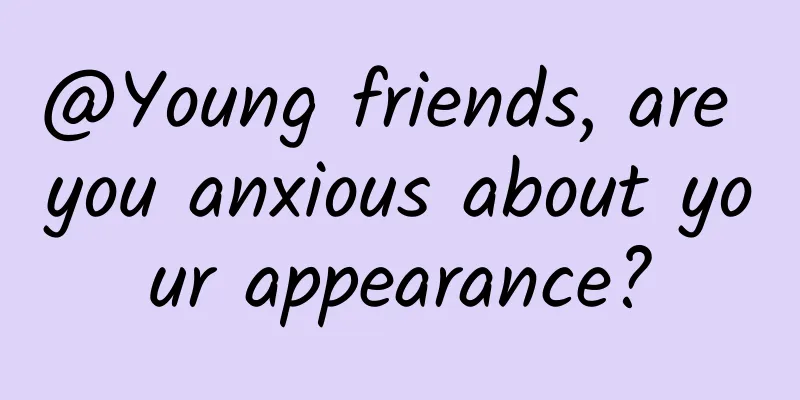@Young friends, are you anxious about your appearance?

|
Appearance anxiety has become a "common visitor" in the lives of modern teenagers and is a topic that must be discussed. Appearance anxiety has many effects on teenagers, and can be likened to a Pandora's box. Appearance anxiety takes away the happiness of teenagers, weakens their self-esteem, becomes an obstacle for them to establish interpersonal relationships, and may lead to social anxiety. In short, appearance anxiety may erode the mental health of teenagers in many ways. Eating disorders are mental disorders with a very high mortality rate, and the early manifestations of eating disorders are often appearance anxiety with the typical characteristics of seeking thinness and fearing fatness. So, how does appearance anxiety arise? And how can we help teenagers accept their bodies? 01 Sociocultural factors that cause appearance anxiety As for how appearance anxiety arises, some people believe that it may be less influenced by biological factors than by social factors. In other words, there is no direct correlation between a person's actual appearance and the degree of appearance anxiety. Some individuals with severe appearance anxiety actually have good appearance in the eyes of outsiders. Scholars mainly emphasize three aspects of social factors: media, peers and parents. One of the functions of the media is to spread "what is good-looking". In different eras, people do not have a certain standard for what is "good-looking", as the saying goes, fat is fat and thin is thin. An intuitive feeling is that in recent years, young actors in TV, movies and short videos are generally thin, especially women, whose faces are getting smaller, waists are getting thinner, and chins are getting sharper. However, such thin figures were not common in TV dramas and movies made in the 1980s and 1990s. Obviously, some "ideal" appearance characteristics have changed in the past 30 years. For women, the ideal appearance is a tall and slender figure, fair and smooth skin, soft and shiny hair, a full forehead, and big eyes; for men, the ideal appearance is a tall and thin figure, with angular facial features and chin... This "stereotyped" image of beauty is repeatedly exposed - not only in movies and TV, but also in advertising spaces at shopping malls or auto shows, and even on the outer packaging of laundry detergent. Under the multiple penetration of the media, ordinary people will gradually accept this kind of "beauty" and regard it as a standard. Unfortunately, in real life, there are actually very few people who can meet these conditions. Secondly, in addition to spreading the stereotype of "beauty", the media also tends to spread the idea that "beauty is good", exaggerating the importance of appearance in life - in TV dramas, girls with beautiful looks may turn from "Cinderella" into "princess" and thus have a happy life. Many adults have an intuitive feeling that today's teenagers seem to care more about their appearance and are more troubled by it than ever before. What is the reason for this? One reason is that teenagers tend to overestimate the impact of their appearance on themselves. However, in real life, is there really a big correlation between appearance and happiness? Appearance does play an important role in the formation of first impressions, but its prediction of happiness is very limited. Using ordinary college students as samples, some studies have even found that there is no correlation between appearance and happiness. As ideal physical features become more and more accepted, the importance of appearance is overestimated, and teenagers who pay little attention to the media are inevitably affected. Peers will discuss what is good-looking, and some are even eager to try and obtain these "ideal" appearance features through some methods, and even encourage teenagers to take some actions together, such as dieting; some kind-hearted parents will remind their growing teenagers that they are a little far from the "ideal" appearance. These direct interactions with important people around them can cause some teenagers to face tremendous pressure on their appearance. 02 Specific factors that cause appearance anxiety In many areas, people have ideal models, but people don't usually always compare themselves with the ideal situation. For example, in the health field, good health is an ideal state. A sick person may compare himself to healthy people and feel self-pity and bitterness from this upward comparison. However, sick people sometimes compare their condition with those who are in worse physical condition, and from this downward comparison they gain the cognition that "my condition is not that bad" and experience a little bit of relief. However, appearance is a very interesting area - people tend to compare themselves to attractive people. This upward comparison makes many teenagers feel that not only their appearance is not up to standard, but also their entire person is not up to standard. 03 How to deal with appearance anxiety scientifically? First, adults can encourage teens to think clearly about what the ideal appearance is and what it would take to achieve it. Teens often have negative views of their own appearance, but their ideas about the ideal appearance are often not so clear in their minds. Adults can suggest that teens with appearance anxiety try to list on paper what the ideal body features are. When they write down some desirable characteristics, they often come up with a contradictory image: slim waist, low weight, good at sports, energetic... As they write, some teenagers will find that it is unlikely for a healthy person to have all these characteristics at the same time. In addition, we also encourage those who have appearance anxiety to pay the price of pursuing an ideal appearance, which may be to spend a lot of time, resources and energy to cover up the "shortcomings" in appearance, which will have a negative impact on study or work; it may be that although the appetite is good, due to the worry about weight, the favorite food is rejected, which makes oneself less fun; it may also be that they originally like sports, but since they use sports as a means to control weight, they suddenly find that sports are a bit like hard labor... Secondly, adults should encourage teenagers to talk about their bodies and appearance in a positive way. When individuals with appearance anxiety talk about their bodies, typical words may be "I am too fat" or "I can't control my mouth and can't help eating." These words are not friendly to teenagers themselves. When teens talk about their bodies this way with their friends and family, it creates an environment that is not friendly to each other's bodies. Encourage teens with appearance anxiety to consciously avoid this type of negative talk, and as adults, work with them to actively enforce it. This seemingly insignificant "small action" actually has great "potential". In research, we also invite young people to seriously consider the positive qualities of their body. It may be the shape of their eyes, the strength of their arms, the unique skin color... Through such activities, young people can not only feel better about their own bodies, but also help those around them. One teenager said, "I never thought that when my mother said to me, 'Oh, I can't fit into this dress again,' and I said to her, 'That dress can't contain your beauty,' my mother's face would be filled with joy. Finally, encourage teenagers to resist the appearance pressure in daily life and bravely say no to some seemingly normal but not so friendly voices. These voices may be "You are so fat", "You are so short", "Your skin is too dark", "You are not suitable for wearing such clothes"... Teenagers may silently endure it, and sometimes even echo these voices, even if they don't like them. Adults can encourage teenagers to respond to such statements by calmly and politely telling the other person that they do not like what the other person said. Adults can also invite teenagers to do something that they would like to do but do not want to do normally. Maybe they have always wanted to go for a morning run, but they have not been able to do it because they are worried that they will look clumsy when running. When she/he actually runs on the street, she/he may find that few people actually notice her/him. This experience is much more effective than telling them "you don't need to worry about your appearance". Wu Wanyu: Postgraduate student at University of Chinese Academy of Sciences Wang Kui: PhD in Psychology, Researcher, Level II Psychological Counselor |
<<: I really recommend eating pumpkin as a staple food! There are more than one reason
>>: Found it! The tomb of Zhang Zhao, an important official of the Three Kingdoms, is in Nanjing
Recommend
10 typical creative materials to reveal the promotion skills of lifestyle APP
Compared with other apps, apps for food, drink, e...
I felt a chill down my spine and when I turned around I found someone was really staring at me. Was this telepathy?
Have you ever had this experience: you feel like ...
Expert from the Ministry of Public Security: Fingerprint leakage in short videos is more severe than the "V gesture"
Yesterday, Japanese media published a report sayi...
36 lessons to help you become an Excel expert
Contents: /36 lessons to help you advance from a ...
"TikTok Short Video Monetization Course" teaches you how to produce, sell goods and build IP
Course Contents: 1. Tik Tok money-making model.mp...
Karaoke returns: an old friend of home entertainment and a new partner of smart TV
Looking back to more than a decade ago, setting u...
60 episodes of Ankasment Jung's Analytical Psychology Theory and Practice Workshop online course video
Ann Casement Jung Analytical Psychology Theory an...
In 2020, how to use short videos to empower brands?
We have been engaged in marketing for ten years a...
How can short videos use Baidu to accurately attract traffic?
I haven’t written an article for a long time. Tod...
3 wrong breakfast combinations, how long have you been eating like this?
For office workers and those who have trouble get...
Wireless charging, say goodbye to the "wired" life!
Wireless charging form There are three types of w...
The Sun is not what we thought it was? There is something else beyond the corona!
Scientists trace solar plasma to high-energy part...
The effect of Cordyceps sinensis on lung cancer. Is Cordyceps sinensis effective against lung cancer?
Due to today's environmental problems and the...
Wedding photography, second-tier e-commerce and other industries information flow delivery cases and data references
Today we are going to talk about the delivery of ...
Is aerobic exercise better than resistance training for controlling blood sugar? 10 Exercise-related blood sugar control questions answered in one article
Many people are worried about the rise in blood s...









